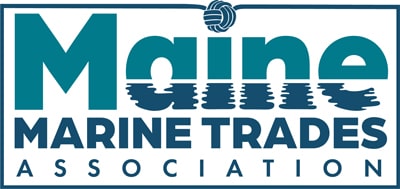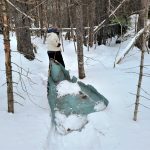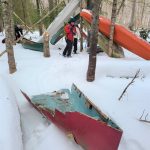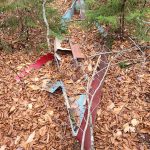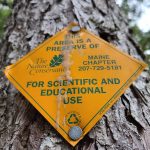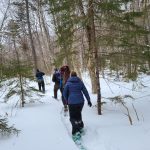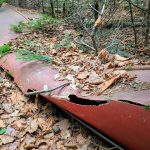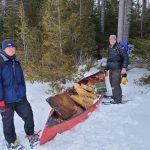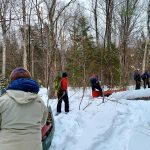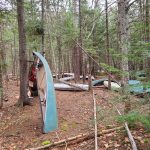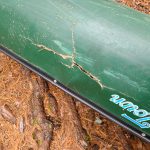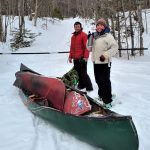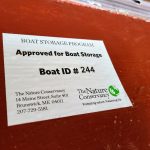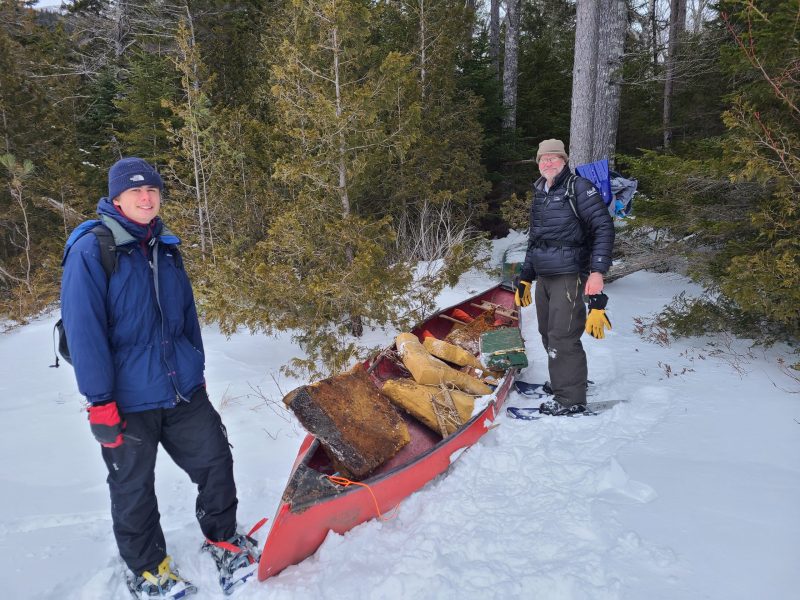
Temperatures were in the single digits in northern Maine. Snow blanketed the wilderness around the Mount Katahdin region. Six volunteers representing the Maine Marine Trades Association (MMTA) were ready to climb on snowmobiles with their snowshoes and backpacks. The goal was a rather unique volunteer workday to help clean up derelict canoes on a remote pond at the Debsconeag Lakes Wilderness Area managed by The Nature Conservancy.
In the fall of 2020 the MMTA’s Executive Director, Stacey Keefer, had reached out to The Nature Conservancy in Maine about a fiberglass vessel recycling grant they were newly involved in. The Rhode Island Marine Trades had engaged Maine and other New England colleagues to help look at sources of unwanted fiberglass boats, identify interested partners, and help develop a recycling network. The collaboration is supported by the NOAA Marine Debris Program and the Brunswick Foundation.
“I knew we could get abandoned boats to recycle from some of our boatyards, but I had seen the canoe problem on some of our beautiful, remote wilderness ponds and raised our hand to help,” Keefer said. “But I didn’t realize quite how bad some ponds were until I reached out to The Nature Conservancy.”
Keefer had originally hoped for a larger volunteer cleanup event, but the pandemic required them to keep the workday small. The workgroup included MMTA Board President Jill Jacobs from New Meadows Marina, Chris Richmond from Allen Insurance and Financial (a past board member), Keefer, and their family members. Carlton Richmond, a high school junior, was able to participate in the project and report back to his outdoor leadership class.
Thanks to support from the New England Outdoor Center near Millinocket, the volunteers started out on a twenty-mile snowmobile ride, then proceeded on snowshoe for over 2 miles to a sixty-six-acre pond. They knew that the pond had at least seventy-five canoes stashed in the woods. About half the canoes were already appropriately stickered through The Nature Conservancy’s registration program. The MMTA volunteers were specifically seeking four fiberglass canoes already known to be dilapidated and unregistered. In theory canoes should drag easily on snow, but cracked fiberglass canoes catch on branches and snow and can be rough to drag. On this one February workday the volunteers were successful in hauling out just two canoes (one of which came out in two halves) plus two contractor bags full of other debris such as foam, old flotation cushions, and plastic trash.
“We are so grateful to the Maine Marine Trades Association and the volunteers who came out to help us clean up Slaughter Pond. Hauling these long-abandoned canoes out of the preserve is the start of a multi-year effort to remove derelict boats from our shores,” said Nancy Sferra, Director of Land Management for The Nature Conservancy.
The canoes will eventually join a few larger fiberglass boats headed south to Massachusetts to be dismantled and the separated fiberglass will be ground up at a recycling center. The ground up material will be shipped in twenty ton increments to a dedicated processing kiln in South Carolina and eventually repurposed in cement aggregate.
Evan Ridley from the Rhode Island Marine Trades was pleased to hear about the contribution to the project coming from Maine. “We are continuing to answer critical questions surrounding the lifecycle of recreational boats and the sustainable reuse of fiberglass waste,” said Ridley. “Boats constructed with composite materials offer an incredible opportunity for the New England marine industry to demonstrate a new pathway for the collection and recycling of high-value scrap derived from thousands of other composite-based products currently being landfilled.”
The Maine Marine Trades Association will be engaging with other industries in Maine about the potential to recycle more fiberglass. Eventually having several regional processing hubs in New England and a local processing kiln would be optimal. There are more fiberglass products and manufacturers beyond boats that could also enter the recycling stream to make a more feasible pathway.
“We realize that the tremendous effort of hauling a few canoes by hand, snowmobile, and truck is not the most efficient debris to collect for recycling –but it sends a bigger message,” said Keefer. “If you can manage to collect difficult things to recycle, then it starts to minimize other excuses. This project also draws attention to the canoe issue on our wilderness ponds and reminds Mainers that our association cares about the stewardship of all Maine waters, even the water bodies that most of us may never see.”
